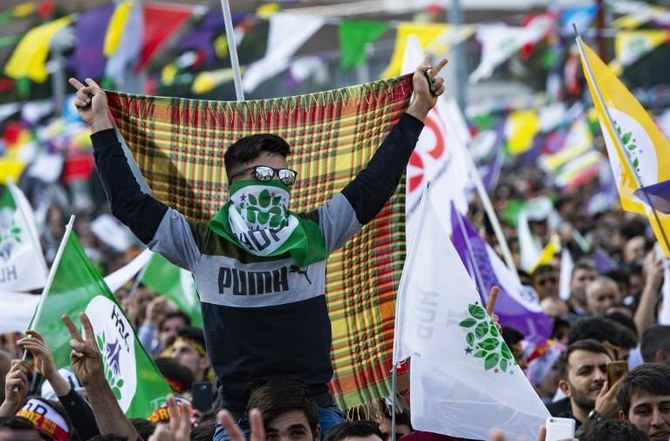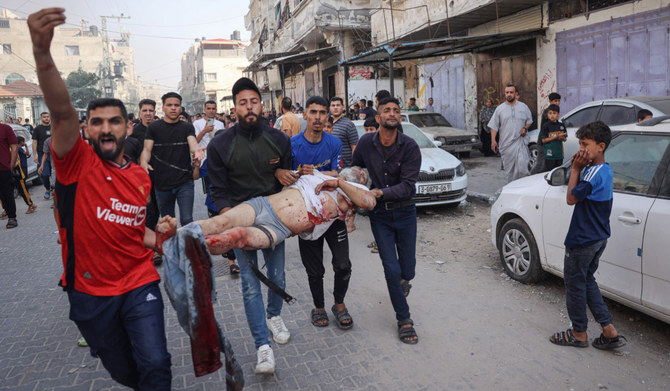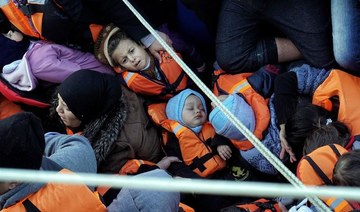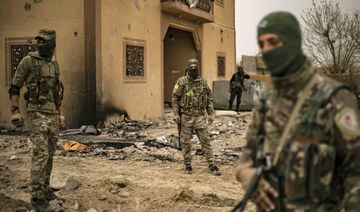DIYARBAKIR, Turkey: Actor Kemal Ulusoy and the rest of his Kurdish theater group lost their jobs along with thousands of others in southeast Turkey after the state seized control of about 100 town councils won by the main pro-Kurdish party at the last local elections.
Voters go to the polls again on Sunday but Ulusoy says the municipal elections are just another performance staged by authorities, after President Tayyip Erdogan warned that the elected officials may again be replaced by state appointees.
“What we are seeing is not democracy,” said Ulusoy, who has performed plays in Kurdish for nearly 30 years. “An election is only held as a formality, to give him the appearance of legitimacy. He can still do what he wants.”
Kurds make up about a fifth of Turkey’s 82 million population. The southeast, mainly Kurdish, has borne the brunt of a three-decades-old conflict between the state and autonomy-seeking PKK militants that has killed more than 40,000 people.
Erdogan, who has been in power for 16 years, says the pro-Kurdish Peoples’ Democratic Party (HDP) has ties with the outlawed militant group. The HDP denies links to the PKK.
The HDP, which has strong support in the southeast, hopes to regain control of municipalities seized by the state in 2016, about two years after the last local elections in 2014. State officials known as kayyums were appointed to run the councils.
But Erdogan has said kayyums may be appointed again if new mayors, like their predecessors, are deemed to have ties to the militants.
The 31 actors in the municipal theater in the city of Diyarbakir are among 15,000 council workers who the HDP says lost their jobs after kayyums were appointed.
“This led to spectacular destruction, injustice and oppression in Diyarbakir in art and culture, as it did in every area of society,” said Ulusoy, who has set up a new theater with colleagues.
His bleak outlook was shared by HDP supporters among tens of thousands of people marking the Kurdish Newroz spring celebration in Diyarbakir who were fiercely critical of state security measures and Erdogan’s election campaigning.
“The president uses very divisive language. Anyone who doesn’t support him is painted as a traitor,” said Geylani Alpay, 63, complaining about his vehicle being searched three times on his journey to the Newroz celebrations.
Nearby, thousands of young people linked hands and danced to Kurdish music blaring from loudspeakers, while others waved red, yellow and green HDP flags.
State boosts investment
The pro-Kurdish party has won the last three parliamentary elections since 2015 comfortably in Diyarbakir and much of the southeast, and Erdogan’s AK Party is their only serious rival in the region.
AK Party supporters say the last two years in Diyarbakir under state-appointed mayor Cumali Atilla has brought greater security and improved services after 1.25 billion lira ($224 million) of investments in roads and parks.
“We can sit in the park in the evenings with our wives. We couldn’t do that in the past because it was too dangerous,” said Yilmaz Polat, 37, a cotton farmer.
The PKK, or Kurdistan Workers’ Party, took up arms in 1984 and is designated a terrorist group by Turkey, the United States and European Union. An explosion of violence after a two-year peace process collapsed in 2015 has killed 4,280 people, according to International Crisis Group data.
Diyarbakir’s historic Sur district was devastated in the fighting but concrete buildings are now rising in the area and militant violence has dwindled after sustained military operations.
Extensive building of highways, apartment blocks and shopping malls has transformed the appearance of the city.
Cevdet Nasiranli, the AK Party candidate for the city’s Kayapinar district, said the situation could deteriorate if the HDP wins. “It is a vote on peace and confidence,” he said.
HDP mayoral candidate Selcuk Mizrakli, a former surgeon, said all the state-run municipality had done was carry out HDP projects for which financing had previously been withheld.
He said his party’s campaign was hampered by a lack of coverage by an overwhelmingly pro-government media and by security forces which he said harassed HDP campaigners.
“There is a society of fear in Turkey,” he said. “The state is behind concrete walls and in armored vehicles.”
Nearly 100 mayors and thousands of party members have been jailed in a crackdown after a 2016 attempted coup which Ankara blames on a US-based Islamic cleric. The United States and European Union have voiced concern about the crackdown.
Interior Minister Suleyman Soylu said 178 current election candidates are being investigated over alleged PKK links. It was not clear where these candidates were running for office.
Hunger strike
The election has also focused attention on a hunger strike by HDP lawmaker Leyla Guven. She is demanding an end to the isolation of jailed PKK leader Abdullah Ocalan, who had a key role in the peace process and is revered by many Kurdish voters.
Guven has refused food for more than four months, surviving on sugar, water and vitamins and losing 15 kg during her protest, her daughter said.
Guven faces up to 31 years in jail on terrorism-related charges over her criticism of Turkey’s incursion into Syria’s Afrin region.
“We are prepared to face death,” Guven told Reuters, speaking in discomfort and with her eyes closed as she lay in bed at her Diyarbakir home.
The HDP has called on the government to respond to what it says are thousands of people, mostly prison inmates, who are on hunger strike along with Guven, also calling for an end to Ocalan’s isolation. In the protest, four people have committed suicide in Turkish jails, it said.
The party also highlighted recent measures targeting Kurdish culture, citing closures of Kurdish associations, broadcasters and the destruction of HDP-erected statues.
Authorities in the city of Adana last month banned a theater festival in which Ulusoy’s Amed City Theatre group — set up in 2017 by those who lost their council theater jobs — was to take part.
The theater’s repertoire includes world classics, from writers such as Moliere, as well Kurdish plays. Ulusoy said its focus was more on comedy, steering clear of the serious themes that have shaped the southeast’s recent history.
“Rather than making people face pain, tragedy and drama, society wants to relax, laugh — a sort of rehabilitation.”
Ousted party seeks to reclaim Kurdish heartlands in Turkish vote
Ousted party seeks to reclaim Kurdish heartlands in Turkish vote

- The Conflict between Turkish government and PKK killed more than 40,000 people
- Kurds make up one fifth of Turkey’s population
Israel attacks Rafah after Hamas claims responsibility for deadly rocket attack

- Israel has killed more than 34,600 Palestinians, according to Gaza’s Health Ministry
CAIRO: Three Israeli soldiers were killed in a rocket attack claimed by Hamas armed wing, near the southern Gaza Strip city of Rafah, where Palestinian health officials said at least 19 people were killed by Israeli fire on Sunday.
Hamas's armed wing claimed responsibility on Sunday for an attack on the Kerem Shalom crossing into Gaza that Israel said killed three of its soldiers.
Israel's military said 10 projectiles were launched from Rafah in southern Gaza towards the area of the crossing, which it said was now closed to aid trucks going into the coastal enclave. Other crossings remained open.
Hamas' armed wing said it fired rockets at an Israeli army base by the crossing, but did not confirm where it fired them from. Hamas media quoted a source close to the group as saying the commercial crossing was not the target.
More than a million Palestinians are sheltering in Rafah, near the border with Egypt.
Shortly after the Hamas attack, an Israeli airstrike hit a house in Rafah killing three people and wounding several others, Palestinian medics said.
The Israeli military confirmed the counter-strike, saying it struck the launcher from which the Hamas projectiles were fired, as well as a nearby "military structure".
"The launches carried out by Hamas adjacent to the Rafah Crossing ... are a clear example of the terrorist organisation's systematic exploitation of humanitarian facilities and spaces, and their continued use of the Gazan civilian population as human shields," it said.
Hamas denies it uses civilians as human shields.
Just before midnight, an Israeli air strike killed nine Palestinians, including a baby, in another house in Rafah, Gaza health officials said. They said the new strike increased the death toll on Sunday to at least 19 people.
Israel has vowed to enter the southern Gaza city and flush out Hamas forces there, but has faced mounting pressure to hold fire as the operation could derail fragile humanitarian efforts in Gaza and endanger many more lives.
Sunday's attack on the crossing came as hopes dimmed for ceasefire talks under way in Cairo.
The war began after Hamas stunned Israel with a cross-border raid on Oct. 7 in which 1,200 people were killed and 252 hostages taken, according to Israeli tallies.
More than 34,600 Palestinians have been killed, 29 of them in the past 24 hours, and more than 77,000 have been wounded in Israel's assault, according to Gaza's health ministry.
Netanyahu uses Holocaust ceremony to brush off international pressure against Gaza offensive

- The ceremony ushered in Israel’s first Holocaust remembrance day since the Oct. 7 Hamas attack that sparked the war, imbuing the already somber day with additional meaning
JERUSALEM: Israeli Prime Minister Benjamin Netanyahu on Sunday rejected international pressure to halt the war in Gaza in a fiery speech marking the country’s annual Holocaust memorial day, declaring: “If Israel is forced to stand alone, Israel will stand alone.”
The message, delivered in a setting that typically avoids politics, was aimed at the growing chorus of world leaders who have criticized the heavy toll caused by Israel’s military offensive against Hamas militants and have urged the sides to agree to a ceasefire.
Netanyahu has said he is open to a deal that would pause nearly seven months of fighting and bring home hostages held by Hamas. But he also says he remains committed to an invasion of the southern Gaza city of Rafah, despite widespread international opposition because of the more than 1 million civilians huddled there.
“I say to the leaders of the world: No amount of pressure, no decision by any international forum will stop Israel from defending itself,” he said, speaking in English. “Never again is now.”
Yom Hashoah, the day Israel observes as a memorial for the 6 million Jews killed by Nazi Germany and its allies in the Holocaust, is one of the most solemn dates on the country’s calendar. Speeches at the ceremony generally avoid politics, though Netanyahu in recent years has used the occasion to lash out at Israel’s archenemy Iran.
The ceremony ushered in Israel’s first Holocaust remembrance day since the Oct. 7 Hamas attack that sparked the war, imbuing the already somber day with additional meaning.
Hamas militants killed some 1,200 people in the attack, making it the deadliest violence against Jews since the Holocaust.
Israel responded with an air and ground offensive in Gaza, where the death toll has soared to more than 34,500 people, according to local health officials, and about 80 percent of Gaza’s 2.3 million people are displaced. The death and destruction has prompted South Africa to file a genocide case against Israel in the UN’s world court. Israel strongly rejects the charges.
On Sunday, Netanyahu attacked those accusing Israel of carrying out a genocide against the Palestinians, claiming that Israel was doing everything possible to ensure the entry of humanitarian aid to the Gaza Strip.
The 24-hour memorial period began after sundown on Sunday with a ceremony at Yad Vashem, Israel’s national Holocaust memorial, in Jerusalem.
There are approximately 245,000 living Holocaust survivors around the world, according to the Claims Conference, an organization that negotiates for material compensation for Holocaust survivors. Approximately half of the survivors live in Israel.
On Sunday, Tel Aviv University and the Anti-Defamation League released an annual Antisemitism Worldwide Report for 2023, which found a sharp increase in antisemitic attacks globally.
It said the number of antisemitic incidents in the United States doubled, from 3,697 in 2022 to 7,523 in 2023.
While most of these incidents occurred after the war erupted in October, the number of antisemitic incidents, which include vandalism, harassment, assault, and bomb threats, from January to September was already significantly higher than the previous year.
The report found an average of three bomb threats per day at synagogues and Jewish institutions in the US, more than 10 times the number in 2022.
Other countries tracked similar rises in antisemitic incidents. In France, the number nearly quadrupled, from 436 in 2022 to 1,676 in 2023, while it more than doubled in the United Kingdom and Canada.
“In the aftermath of the October 7 war crimes committed by Hamas, the world has seen the worst wave of antisemitic incidents since the end of the Second World War,” the report stated.
Netanyahu also compared the recent wave of protests on American campuses to German universities in the 1930s, in the runup to the Holocaust. He condemned the “explosion of a volcano of antisemitism spitting out boiling lava of lies against us around the world.”
Nearly 2,500 students have been arrested in a wave of protests at US college campuses, while there have been smaller protests in other countries, including France. Protesters reject antisemitism accusations and say they are criticizing Israel. Campuses and the federal government are struggling to define exactly where political speech crosses into antisemitism.
Hezbollah fires rockets at Israel after south Lebanon strike kills 4 members of family

- Shells fall on Kiryat Shmona and reach northern Golan
- Maronite Patriarch Bechara Al-Rahi calls for end to war in southern Lebanon
BEIRUT: An Israeli airstrike killed four members of a family in a border village in southern Lebanon on Sunday, security sources said.
Hezbollah, in retaliation, fired Katyusha rockets at the northern Israeli town of Kiryat Shmona, close to the Lebanese border.
The four family members killed in Mays Al-Jabal were identified as Fadi Hounaikah and Maya Ali Ammar, and their sons Mohammed, 21, and Ahmad, 12.
The attack occurred when the family took advantage of a de-escalation of hostilities between Hezbollah and Israel to return to their properties to assess damage and move goods from their supermarket to a location outside the village.

A security source in the area told Arab News that while the family was gathering their groceries from the supermarket, an Israeli military drone spotted them and launched an attack, destroying the area and killing all the members of the family and injuring several civilians in the vicinity.
The source clarified that villages in the area were empty because “residents fled the area seven months ago.”
He added: “When residents want to enter these villages to attend victims’ funerals, they send their names and car number plates to the Lebanese Army and UNIFIL, who in turn coordinate with the Israeli side to spare these funerals (from attack).
“In general, people cannot enter border villages without taking into consideration the Israeli danger, as Israeli reconnaissance planes and drones are hovering over the area 24/7. However, what Israel committed against this family is a terrible massacre.”
Hezbollah responded to the incident by launching dozens of Katyusha and Falaq missiles at Israel. The group said the operation was “in response to the crime committed by Israel in the Mays Al-Jabal village.”
The Israeli Upper Galilee Regional Council announced that missiles hit buildings in Kiryat Shmona, while Israeli Army Radio reported that some of the rockets fell inside the city, causing a power outage.
An Israeli army spokesman reported that 65 rockets were launched from southern Lebanon toward Israeli settlements in the Upper Galilee region.
Meanwhile, Israeli airstrikes hit the villages of Al-Adissa and Kafr Kila, while artillery shelling hit the village of Aitaroun.
Maronite Patriarch Bechara Al-Rahi in his Sunday sermon called for an end to the war in southern Lebanon, urging an end to the “demolition of homes, the destruction of shops, the burning of the land and its crops, and the killing and displacement of innocent civilians and the destruction of their livelihood in an economic condition that has already impoverished them.”
Mohammed Raad, leader of Hezbollah’s parliamentary bloc, meanwhile, expressed his disapproval of the West’s backing for Israel.
He said that Israel “faces no international deterrent. On the contrary, some support it in committing crimes.”
He accused those who support Israel of being “hypocrites and liars who falsely claim to champion human rights, civilization, and progress in the West, (yet) they provide Israel with financial aid, weapons, smart bombs, and a continuous air bridge.”
Raad concluded: “We are not afraid of Israel’s insanity. We are prepared to confront them directly. We are prepared to sacrifice and shed blood to protect our homeland, independence, and honor.”
UNRWA chief says again barred entry to Gaza by Israel

- “Just this week, they have denied — for the second time — my entry to Gaza where I planned to be with our UNRWA colleagues including those on the front lines”: Lazzarini
JERUSALEM: The head of the UN agency for Palestinian refugees, UNRWA, said Sunday that Israeli authorities had barred him from entering Gaza for a second time since the Israel-Hamas war started on October 7.
“Just this week, they have denied — for the second time — my entry to Gaza where I planned to be with our UNRWA colleagues including those on the front lines,” Philippe Lazzarini wrote on X, formerly Twitter.
Lazzarini has been to Gaza four times since the war broke out including on March 17.
“The Israeli authorities continue to deny humanitarian access to the United Nations,” he said on Sunday.
“Only in the past two weeks, we have recorded 10 incidents involving shooting at convoys, arrests of UN staff including bullying, stripping them naked, threats with arms & long delays at checkpoints forcing convoys to move during the dark or abort,” Lazzarini said.
He also called for an “independent investigation” into rocket fire that led to the closure of a key Israel-Gaza aid crossing.
Hamas’s armed wing, Ezzedine Al-Qassam Brigades, claimed responsibility for the Sunday launch, saying militants had targeted Israeli troops in the area of Kerem Shalom crossing.
Houthis claim Red Sea victory against US Navy

- Militia forces lack technical or military capability to achieve their objectives in the Mediterranean, analyst says
AL-MUKALLA: The Houthis have reiterated a warning of strikes against ships bound for or with links to Israel — including those in the Mediterranean — as they claimed victory against the US Navy in the Red Sea.
The Houthi-controlled SABA news agency reported that the fourth phase of the militia’s pro-Palestine campaign would involve targeting all ships en route to Israel that came within range of their drones and missiles, noting that the US, UK, and other Western navies “stood helpless” in the face of their attacks.
“The fourth phase demonstrates the striking strength of the Yemeni armed forces in battling the world’s most potent naval weaponry, the American, British and European fleets, as well as the Zionist (Israel) navy,” SABA said.
Houthi military spokesman Yahya Sarea said on Friday strikes against Israel-linked ships would be expanded to the Mediterranean. Attacks would be escalated to include any companies interacting with Israel if the country carried out its planned attack on the Palestinian Rafah.
Since November, the Houthis have launched hundreds of ballistic missiles and drones at commercial and navy vessels in the Red Sea, Bab Al-Mandab Strait and the Gulf of Aden. They claim attacks are only aimed at ships linked with Israel in a bid to force an end to its siege on the Gaza Strip.
They have also fired at US and UK commercial and navy ships in international waters off Yemen after the two countries launched strikes against Houthi-controlled areas.
On Saturday, Houthi information minister Dhaif Allah Al-Shami claimed the US was forced to withdraw its aircraft carrier and other naval ships from the Red Sea after failing to counteract attacks. He added new offensives would begin against Israeli ships in the Mediterranean in the coming days.
“They failed badly. Yemeni missiles and drones beat the US Navy, and its military, cruisers, destroyers and aircraft carriers started to retreat from our seas,” Al-Shami said in an interview with Lebanon’s Al-Mayadeen TV news channel.
Yemen specialists have disputed Houthi assertions that they have military weapons capable of reaching Israeli ships in the Mediterranean.
Brig. Gen. Mohammed Al-Kumaim, a Yemeni military analyst, told Arab News on Sunday the Houthis would only be able to carry out such attacks if they had advanced weaponry. He said the Houthis were expanding their campaign against ships to avoid growing public resentment in areas under their control after the militia had failed to pay public employees and repair services.
Al-Kumaim added the Houthis might claim responsibility for an attack on a ship in the Mediterranean which was carried out by an Iran-backed group operating in the region.
“Theoretically and technologically, the Houthis lack any technical or military capability to achieve their objectives (in the Mediterranean),” Al-Kumaim said.



















